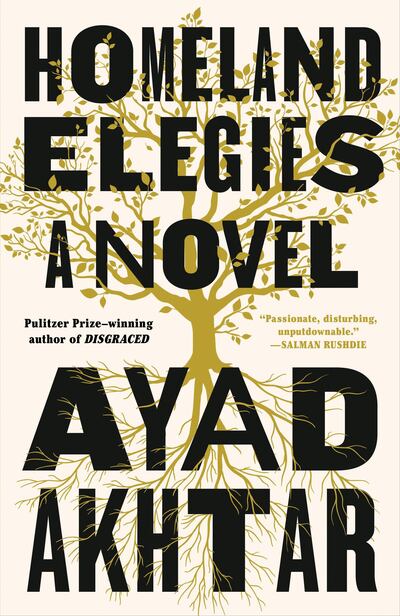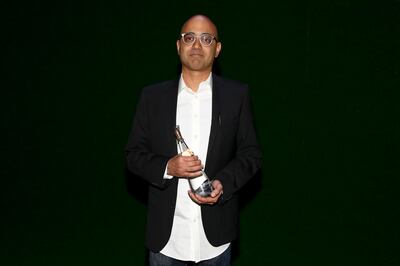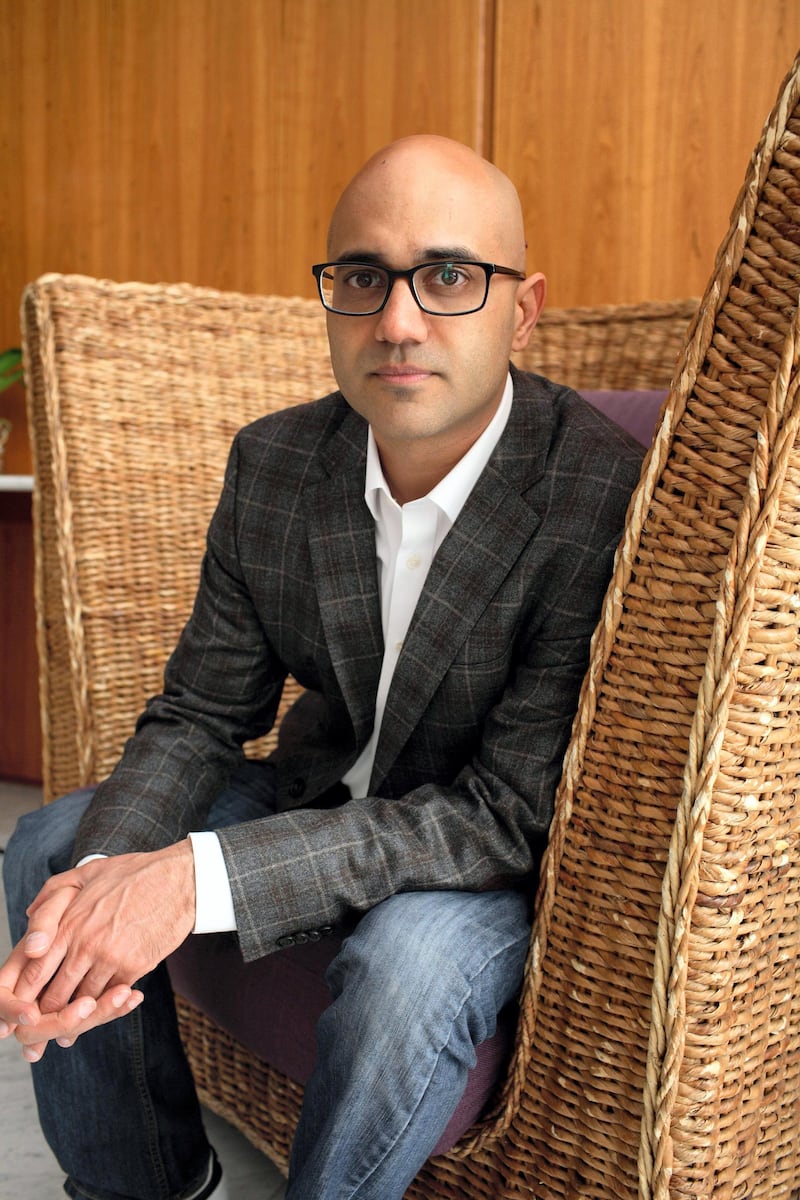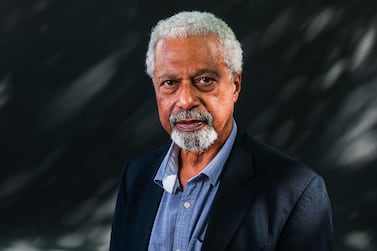In 2012, Ayad Akhtar published his first novel, American Dervish, a tender but also incisive coming-of-age tale about a Pakistani-American youth growing up in 1980s Milwaukee, examining who he is and what he believes in. Akhtar, 49, who was born in New York City to Pakistani parents, continued to explore the Muslim experience in America through a string of critically acclaimed plays. Asked once what part of his work is him sorting out who he is, he answered, emphatically: "All of it."
Akhtar's new book – his second novel – is something of a departure. Sorting out his sense of identity was no longer the issue. "Here," he tells The National, "it was a matter of sorting out my sense of our country."
If Akhtar's debut dealt with a boy coming to terms with Islam then Homeland Elegies is about a man coming to terms with America. That man – the book's narrator – is a fictional version of Akhtar. He shares the same name as his creator and much of his life story: his parents are both doctors who emigrated from Pakistan to the US in the 1960s; he grew up in Milwaukee; he studied at Brown University; he won a Pulitzer Prize for his 2013 play Disgraced – a provocative drama in which an American-born Muslim character admits to feeling an unbidden "blush" of pride for 9/11.

The narrator also shares and voices Akhtar's fears and frustrations concerning his homeland. In the novel's introduction or "overture" entitled "To America", he laments the state of the nation – its moral collapse, economic hardships and societal injustices. Artfully blending fact and fiction, the book goes on to examine the relationship between an American son and his immigrant father, and how change in their country transforms their views and affects their lives.
“I wanted to respond to my country, to what has happened to our country,” Akhtar says. “I wanted to articulate the state we’ve found ourselves in, and I wanted to speak – directly speak, if possible – to the national conscience, if you will.”
Akhtar says he wrote the book "in something of a fever dream" after a succession of pivotal events. "My mother's passing, my father's decline, Donald Trump's election and the widespread disrepair I had been seeing for years – all of this pushed this book out of me, a sustained emotional cry that lasted 11 months. It was a creative experience like nothing I've ever experienced before."
The narrator reveals how his father was enamoured by America while his mother was more critical and hankered after the life she left behind in Pakistan. We learn how his father became Trump's cardiologist in the early 1990s and bonded with him while treating him for heart palpitations. He remained mesmerised by Trump until his election, in awe of his wealth and lifestyle and in defence of his views and ideas, such as his proposal for a Muslim database. "I was his doctor," he tells Akhtar, "so we don't have anything to worry about."
In other sections the spotlight is on Akhtar. Over the years he travels with his family to Abbottabad, makes his name as a playwright, falls in love and gets rich quick by investing in a clever scheme devised by a Pakistani-American hedge-fund manager.
He also introduces us to a woman called Mary Moroni who gave him encouragement and direction in his formative years.
This person was no fictional invention. "She was a high-school teacher who changed my life," Akhtar says. "I fell in love with literature in her class, and knew from the time I was 15 that I wanted to give my life to stories. That is a love and a sense of purpose that has never left me."
At the end of the book, the narrator comes full circle by returning to his father in his past years as he wrestles with his demons, fights to uphold his professional reputation and changes his mind about his former patient and the now-president of the US. "Trump," he tells his son, "was a big mistake."
It is hard to know how much of what Akhtar writes is autobiographical. Put another way, it is easy to see his book as a memoir rather than a novel. And yet he insists it is the latter and describes himself as "the sort of writer who has always felt the need to deform actual events enough to be able to see them more clearly." For him, fusing fact and fiction was a necessary approach.
"It felt to me that in order to really mirror and address the collapse of consensus and the crumbling state of our politics, I had to find a form that would express the confusion around truth that has become fundamental to our shared reality, or unreality if you will.
“I knew I would need a form that would traffic in the confusion between fact and fiction, in the seductions of narrative, the substitution of a good story for the truth. Entertainment is now the dominant model of politics, of thought.”
It is tempting to believe that the racial abuse endured by the narrator and various members of his family is based on real experience.

In New York on 9/11, he joins a long line of people waiting to give blood, only to be told by the man in front: "We don't want your Arab blood." Eight years later, at a petrol station convenience store, he is mocked by a fellow customer who delivers a parting shot: "Can't wait when we build that wall to keep you critters out." At one low point he makes a tough decision: "I was going to stop pretending that I felt like an American."
And yet these instances are rare, or at least not dwelled upon, for as Akhtar reiterates, “the argument of the book is so much larger than any question of identity. The opening overture lays it out very clearly: Notwithstanding the difficulties I have seen and been through as a Muslim post-9/11, even those difficulties did not prepare me to understand what had happened to America. It was not until I saw what was happening to all of us Americans, not just Muslims, or people of colour, that I came to see the picture that made sense of our affliction.”
That picture is a sobering sight to behold.
“America is riven by divides,” Akhtar tells me. Rural against urban, heartland against coast, economic divides, racial divides. Many of these are long-standing tensions that are coming to the surface, some are newly exacerbated by the course of the country’s shifting economics.
"I'm not sure Trump is the only reason for all these divides," he goes on. "The country is divided and that Trump is canny enough to know that playing those divides is what helps him politically."
In the novel, Akhtar’s father does not recognise that picture. If there are divisions then they can be papered over with acquired wealth. America for him is a land of opportunity. However, his friend Latif reminds him of the harsh price of failure: “This country makes you a criminal for being poor.”
Akhtar agrees that money is the measure of success in America. “There are no other competing collective markers,” he says. “In the book, the narrator, who has my name and many of the facts of my life, succeeds in that sense. But his success is haunted by the predation on which it is predicated.
"I always knew the book would have to stage that process of accomplishing the American dream, seducing the reader in the process and revealing the ultimately moral dubiousness of an idea of fulfilment that is, ultimately, only a material one."
Homeland Elegies is a captivating work ablaze with fierce intelligence and deep insight.







